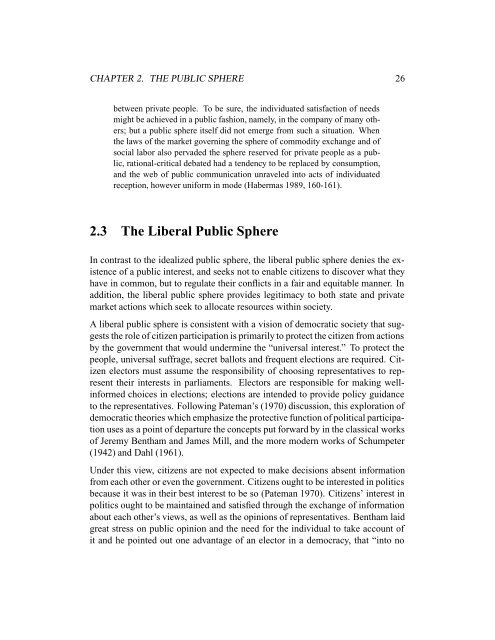Expanding the Public Sphere through Computer ... - ResearchGate
Expanding the Public Sphere through Computer ... - ResearchGate
Expanding the Public Sphere through Computer ... - ResearchGate
You also want an ePaper? Increase the reach of your titles
YUMPU automatically turns print PDFs into web optimized ePapers that Google loves.
CHAPTER 2. THE PUBLIC SPHERE 26<br />
between private people. To be sure, <strong>the</strong> individuated satisfaction of needs<br />
might be achieved in a public fashion, namely, in <strong>the</strong> company of many o<strong>the</strong>rs;<br />
but a public sphere itself did not emerge from such a situation. When<br />
<strong>the</strong> laws of <strong>the</strong> market governing <strong>the</strong> sphere of commodity exchange and of<br />
social labor also pervaded <strong>the</strong> sphere reserved for private people as a public,<br />
rational-critical debated had a tendency to be replaced by consumption,<br />
and <strong>the</strong> web of public communication unraveled into acts of individuated<br />
reception, however uniform in mode (Habermas 1989, 160-161).<br />
2.3 The Liberal <strong>Public</strong> <strong>Sphere</strong><br />
In contrast to <strong>the</strong> idealized public sphere, <strong>the</strong> liberal public sphere denies <strong>the</strong> existence<br />
of a public interest, and seeks not to enable citizens to discover what <strong>the</strong>y<br />
have in common, but to regulate <strong>the</strong>ir conflicts in a fair and equitable manner. In<br />
addition, <strong>the</strong> liberal public sphere provides legitimacy to both state and private<br />
market actions which seek to allocate resources within society.<br />
A liberal public sphere is consistent with a vision of democratic society that suggests<br />
<strong>the</strong> role of citizen participation is primarily to protect <strong>the</strong> citizen from actions<br />
by <strong>the</strong> government that would undermine <strong>the</strong> “universal interest.” To protect <strong>the</strong><br />
people, universal suffrage, secret ballots and frequent elections are required. Citizen<br />
electors must assume <strong>the</strong> responsibility of choosing representatives to represent<br />
<strong>the</strong>ir interests in parliaments. Electors are responsible for making wellinformed<br />
choices in elections; elections are intended to provide policy guidance<br />
to <strong>the</strong> representatives. Following Pateman’s (1970) discussion, this exploration of<br />
democratic <strong>the</strong>ories which emphasize <strong>the</strong> protective function of political participation<br />
uses as a point of departure <strong>the</strong> concepts put forward by in <strong>the</strong> classical works<br />
of Jeremy Bentham and James Mill, and <strong>the</strong> more modern works of Schumpeter<br />
(1942) and Dahl (1961).<br />
Under this view, citizens are not expected to make decisions absent information<br />
from each o<strong>the</strong>r or even <strong>the</strong> government. Citizens ought to be interested in politics<br />
because it was in <strong>the</strong>ir best interest to be so (Pateman 1970). Citizens’ interest in<br />
politics ought to be maintained and satisfied <strong>through</strong> <strong>the</strong> exchange of information<br />
about each o<strong>the</strong>r’s views, as well as <strong>the</strong> opinions of representatives. Bentham laid<br />
great stress on public opinion and <strong>the</strong> need for <strong>the</strong> individual to take account of<br />
it and he pointed out one advantage of an elector in a democracy, that “into no
















